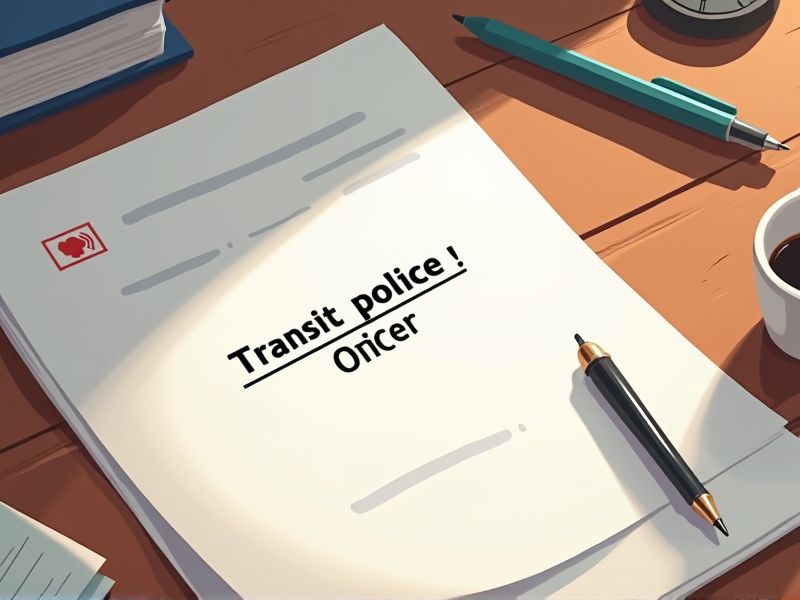
Transit police officers operate in complex environments that require multifaceted skills to ensure public safety. These officers face unique challenges such as managing large crowds, handling emergencies in confined spaces, and addressing crimes specifically related to transit systems. Certification in specific areas ensures that officers are adequately prepared to respond effectively to these diverse scenarios. Some essential certifications for a transit police officer include those in emergency response, conflict resolution, and transportation regulations.
Basic Law Enforcement Training Certification
Basic Law Enforcement Training Certification is essential for transit police officers because it ensures they are equipped with the necessary skills to handle public safety and crime prevention efficiently. This certification provides specialized knowledge in areas like crisis management and de-escalation techniques, which are crucial in high-density transit environments. It ensures officers understand legal protocols and procedures to uphold laws and regulations effectively. The certification fosters public trust by ensuring officers are qualified and prepared to protect community safety.
Transit Police Academy Certification
Completing the Transit Police Academy Certification ensures that officers possess the necessary skills and knowledge specific to handling transit environments, which often feature unique challenges compared to other policing areas. This certification helps officers learn how to manage crowd control effectively and address incidents rapidly within transit systems. The training covers legal aspects, ensuring that officers understand the specific laws and regulations governing transit operations, which aids them in enforcing rules accurately. Certification also enhances public trust, as it demonstrates that officers have undergone specialized training tailored to the complexities of transit policing.
Firearms Proficiency Certification
Firearms Proficiency Certification ensures that transit police officers are prepared to respond effectively to armed threats, which can enhance passenger safety. Improved proficiency helps in reducing the risk of accidental discharge, thus minimizing potential harm to civilians. Certification establishes a standard of competency that fosters public trust in the officers' ability to handle critical situations. Training for certification also provides an opportunity for officers to stay updated with the latest safety protocols and technological advancements in firearms.
Defensive Tactics Certification
Defensive Tactics Certification equips transit police officers with skills to handle physical altercations effectively, reducing the risk of injury to themselves and others. Data suggests that trained officers are better at de-escalating potentially volatile situations, leading to safer outcomes. Certification ensures officers adhere to standardized procedures, which aligns with legal and departmental accountability. It also enhances community trust, as it demonstrates a commitment to professionalism and appropriate use of force.
Emergency Vehicle Operations Certification
Emergency Vehicle Operations Certification ensures transit police officers can safely and effectively handle emergency vehicles during critical situations, minimizing risks to public safety. Proper training in vehicle operation reduces the likelihood of accidents, which leads to fewer injuries and lower liability for police departments. Certified officers can respond more quickly to emergencies, improving overall response times and service to the community. The certification enhances an officer's readiness and proficiency, aligning with department standards and public safety requirements.
CPR/First Aid Certification
Transit police officers frequently encounter medical emergencies, necessitating CPR/First Aid certification to provide immediate assistance. Quick response during incidents like sudden cardiac arrest can increase survival rates, a critical factor in crowded public transit settings. Certification ensures officers possess the skills to stabilize individuals until medical professionals arrive. This preparation enhances public trust and safety within the transit system.
Crisis Intervention Training Certification
Crisis Intervention Training Certification equips transit police officers with skills to effectively manage situations involving individuals with mental health issues. This certification enhances officers' ability to de-escalate potential conflicts, reducing the risk of harm to both civilians and officers. Transit environments often involve high-stress scenarios; having officers trained in crisis intervention improves overall safety. Such training fosters better community relationships, ensuring that law enforcement approaches are compassionate and informed.
Incident Command System Certification
Transit police officers often encounter complex emergencies involving public transportation systems. Having an Incident Command System Certification equips them with standardized procedures for managing incidents effectively. This training enhances coordination with other emergency services in multi-agency responses. Improved communication and resource allocation during incidents can significantly increase safety for both officers and the public.
Community Policing Certification
Community Policing Certification equips transit police officers with skills to engage positively with diverse commuter populations, fostering trust and cooperation. When officers gain this certification, it leads to a reduction in crime rates as they implement proactive strategies tailored to specific community needs. Educated officers also improve passenger safety by addressing concerns and effectively preventing potential conflicts on public transit. This specialized training enhances communication and collaboration between police and the community, creating a safer transit environment for all.
De-escalation and Communication Certification
Transit environments can be high-stress and unpredictable, requiring officers to manage tense situations effectively. De-escalation and communication training reduce the likelihood of conflicts escalating into violence, ensuring passenger and officer safety. This certification fosters trust between transit police and the community by promoting transparent and respectful interactions. Skills gained in de-escalation help officers handle diverse scenarios, such as mental health crises, more effectively and humanely.
Summary
When you acquire certifications as a transit police officer, your skill set and credibility improve. This enhancement increases your competency, enabling more effective law enforcement and community engagement. Departments often take notice, potentially offering career advancement and higher salaries as a result. Improved public trust follows, fostering safer and more efficient transit systems.
